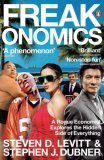Summary | Excerpt | Reading Guide | Reviews | Readalikes | Genres & Themes | Author Bio
A Rogue Economist Explores the Hidden Side of Everything

Critics' Opinion:
Readers' Opinion:
First Published:
Apr 2005, 256 pages
Paperback:
Apr 2006, 256 pages
Now picture two candidates, one intrinsically appealing and the other not
so. The appealing candidate raises much more money and wins easily. But was
it the money that won him the votes, or was it his appeal that won the votes
and the money?
That's a crucial question but a very hard one to answer. Voter appeal,
after all, isn't easy to quantify. How can it be measured?
It can't, really -- except in one special case. The key is to measure a
candidate against ... himself. That is, Candidate A today is likely to be
similar to Candidate A two or four years hence. The same could be said for
Candidate B. If only Candidate A ran against Candidate B in two consecutive
elections but in each case spent different amounts of money. Then, with the
candidates' appeal more or less constant, we could measure the money's
impact.
As it turns out, the same two candidates run against each other in
consecutive elections all the time indeed, in nearly a thousand U.S.
congressional races since 1972. What do the numbers have to say about such
cases?
Here's the surprise: the amount of money spent by the candidates
hardly matters at all. A winning candidate can cut his spending in half
and lose only 1 percent of the vote. Meanwhile, a losing candidate who
doubles his spending can expect to shift the vote in his favor by only that
same 1 percent. What really matters for a political candidate is not
how much you spend; what matters is who you are. (The same could be said and
will be said, in chapter 5 about parents.) Some politicians are inherently
attractive to voters and others simply aren't, and no amount of money can do
much about it. (Messrs. Dean, Forbes, Huffington, and Golisano already know
this, of course.)
And what about the other half of the election truism -- that the amount
of money spent on campaign finance is obscenely huge? In a typical election
period that includes campaigns for the presidency the Senate, and the House
of Representatives, about $1 billion is spent per year -- which sounds like
a lot of money, unless you care to measure it against something seemingly
less important than democratic elections.
It is the same amount, for instance, that Americans spend every year on
chewing gum.
This isn't a book about the cost of chewing gum versus campaign spending per
se, or about disingenuous real-estate agents, or the impact of legalized
abortion on crime. It will certainly address these scenarios and dozens
more, from the art of parenting to the mechanics of cheating, from the inner
workings of the Ku Klux Klan to racial discrimination on The Weakest
Link. What this book is about is stripping a layer or two from the
surface of modern life and seeing what is happening underneath. We will ask
a lot of questions, some frivolous and some about life and death issues. The
answers may often seem odd but, after the fact, also rather obvious. We will
seek out these answers in the data -- whether those data come in the form of
schoolchildren's test scores or New York City's crime statistics or a crack
dealer's financial records. (Often we will take advantage of data that were
incidentally left behind, like an airplane's sharp contrail in a high sky.)
It is well and good to opine or theorize about a subject, as humankind is
wont to do, but when moral posturing is replaced by an honest assessment of
the data, most subjects actually become even more compelling.
Morality, it could be argued, represents the way that people would like
the world to work whereas economics represents how it actually does work.
Economics is above all a science of measurement. It comprises an
extraordinarily powerful and flexible set of tools that can reliably assess
a thicket of information to determine the effect of any one factor, or even
the whole effect. That's what "the economy" is, after all: a thicket of
information about jobs and real estate and banking and investment. But the
tools of economics can be just as easily applied to subjects that are more
-- well, more interesting.
The foregoing is excerpted from Freakonomics by Steven D. Levitt and Stephen J. Dubner. All rights reserved. No part of this book may be used or reproduced without written permission from HarperCollins Publishers, 10 East 53rd Street, New York, NY 10022





The Flower Sisters
by Michelle Collins Anderson
From the new Fannie Flagg of the Ozarks, a richly-woven story of family, forgiveness, and reinvention.

The House on Biscayne Bay
by Chanel Cleeton
As death stalks a gothic mansion in Miami, the lives of two women intertwine as the past and present collide.

The Funeral Cryer by Wenyan Lu
Debut novelist Wenyan Lu brings us this witty yet profound story about one woman's midlife reawakening in contemporary rural China.
Your guide toexceptional books
BookBrowse seeks out and recommends the best in contemporary fiction and nonfiction—books that not only engage and entertain but also deepen our understanding of ourselves and the world around us.